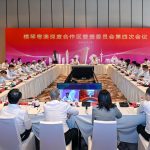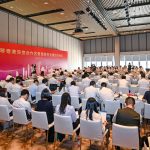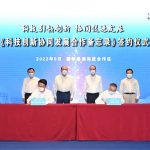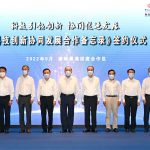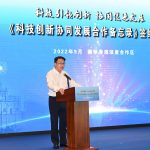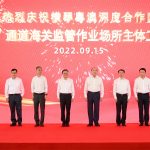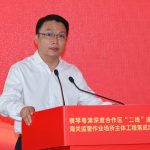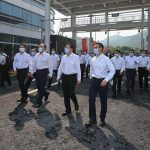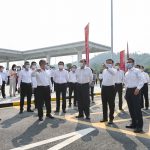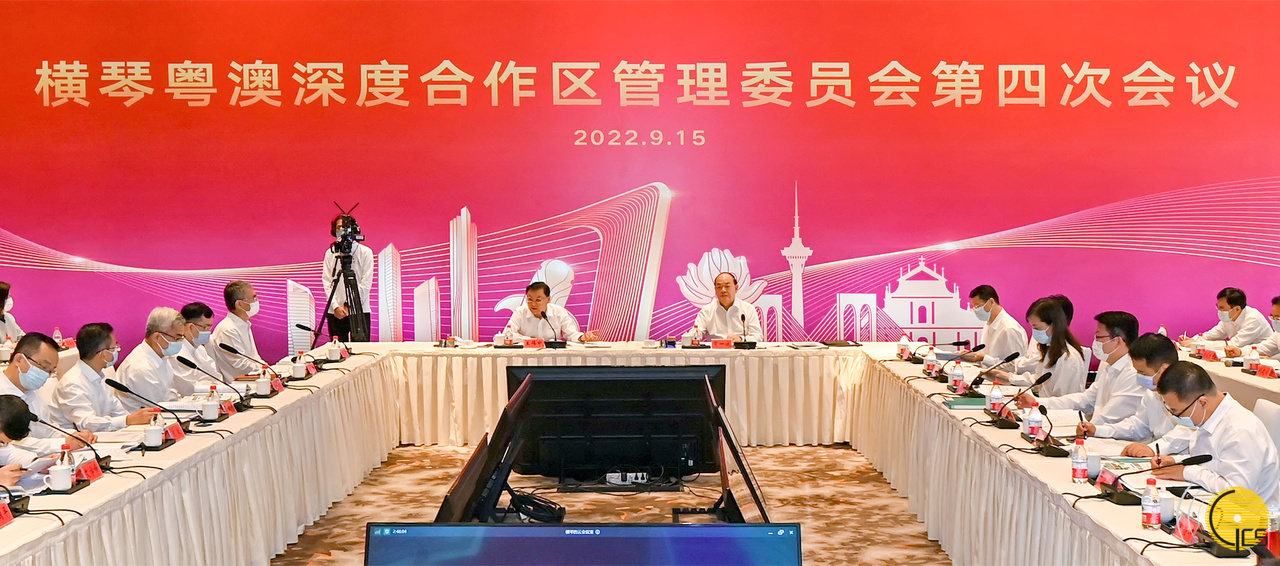 The fourth meeting of the Administrative Committee of the Guangdong-Macao Intensive Cooperation Zone in Hengqin is co-chaired by the Administrative Committee's two directors: the Chief Executive of the MSAR, Mr Ho Iat Seng, and the Governor of Guangdong Province, Mr Wang Weizhong.
The fourth meeting of the Administrative Committee of the Guangdong-Macao Intensive Cooperation Zone in Hengqin is co-chaired by the Administrative Committee's two directors: the Chief Executive of the MSAR, Mr Ho Iat Seng, and the Governor of Guangdong Province, Mr Wang Weizhong.
The Administrative Committee of the Guangdong-Macao Intensive Cooperation Zone in Hengqin held there its fourth meeting this morning, reviewing its work over the past year, discussing the Cooperation Zone’s future plans, and sharing among participants suggestions for impending projects.
The meeting was chaired jointly by the Administrative Committee’s two directors: the Chief Executive of the Macao Special Administrative Region (MSAR), Mr Ho Iat Seng, and the Governor of Guangdong Province, Mr Wang Weizhong.
In his opening remarks, Mr Ho once again thanked the Guangdong government for its generous support for the Cooperation Zone.
A plaque-unveiling ceremony – held a year ago, and witnessed by the Vice Premier Han Zheng – had marked the establishment of the Administrative Committee, opening a new chapter for the Cooperation Zone, and presenting Macao with historic opportunities in economic and social development, said Mr Ho.
He noted that positive changes could be seen in the Cooperation Zone over the past year in terms of institutional governance systems, perspectives, social integration and growth drivers, marking a fruitful and eventful year for Guangdong-Macao cooperation.
In concluding his remarks, the Chief Executive put forward four aspirations for the next phase of development of the Cooperation Zone.
The first was to come up with innovative ideas while staying true to the original intent of the Cooperation Zone.
Mr Ho said those involved should dare to try out new approaches in order to seek breakthroughs in the development of the Cooperation Zone, as long as such approaches were in line with the “four new” strategic positions outlined in the Master Plan of the Development of the Guangdong-Macao Intensive Cooperation Zone in Hengqin, and were true to the original objective of establishing the zone.
The second aspiration raised by Mr Ho was to press ahead with the integration of Hengqin and Macao.
He pointed out that Hengqin-Macao integration was one of the key development goals of the Cooperation Zone, and thus it was important to apply further effort in this regard. In particular, more should be done regarding administrative arrangements to advance the Cooperation Zone’s special tariff system by tiers, cross-boundary financial management, relaxation of regulations for market entry, and facilitation of movement of people, as well as alignment of public services in the Cooperation Zone with public services in Macao, and application of international standards for trade and investment.
The third aspiration raised by Mr Ho was to put the Cooperation Zone’s Master Plan into practice in its economic and social aspects. The various development goals and benchmarks outlined in the Master Plan should be implemented in earnest.
The fourth aspiration was to further incentivise members of the Executive Committee of the Cooperation Zone in their daily work.
Members of the Executive Committee of the Cooperation Zone shouldered a great responsibility as they were on the front line of implementing the Master Plan, and should work conscientiously to facilitate the sharing mechanism between Guangdong and Macao, said Mr Ho.
For his part, Guangdong’s Governor Mr Wang said the Cooperation Zone had put its best foot forward in the first year since its establishment, and made steady progress in implementing the Master Plan by sticking steadfastly to guidelines given by President Xi Jinping and by the Central People’s Government.
Mr Wang went on to point out that the Cooperation Zone was increasingly prominent in terms of: serving Macao’s development goals; developing helpful preferential policies; and in advancing industrial specialisation. This was testament to the systemic strength of socialism with Chinese characteristics and the vitality of the “One country, two systems” principle, he said.
The Governor then outlined five major tasks for the Cooperation Zone in the days ahead.
First, the “four new” strategic positions outlined in the Master Plan should be bolstered, in order to attract more investment, enterprises and talent from Macao, and to better serve the development of the Guangdong-Hong Kong-Macao Greater Bay Area, as well as to support Macao’s integration into national development.
Second, the effective implementation of major policies should be made a priority. It was hoped that policies related to the establishment of a special tariff system by tiers and cross-boundary financial management could be realised by the end of this year.
Third, high-quality sustainable development should be promoted by facilitating high-end manufacturing, expediting the growth of the traditional Chinese medicine sector, and upgrading the cultural, tourism and trade sectors, as well as building an international hub of technological innovation in the Greater Bay Area.
Fourth, the interconnection in social services between the Cooperation Zone and Macao and the infrastructure interconnectivity should be deepened. Meanwhile, the quality of education, healthcare and social services in the Cooperation Zone should be enhanced, in order to offer people a favourable environment in which to live and work.
Fifth, the mechanism for mutual discussion, mutual development and joint administration between Guangdong and Macao should be continuously enhanced to take the Cooperation Zone to the next level. Such concrete action would be a way to welcome the opening of the 20th National Congress of the Chinese Communist Party.
During today’s meeting, the Secretary for Economy and Finance of the MSAR Government and Chairman of the Cooperation Zone's Executive Committee, Mr Lei Wai Nong, reported on the work done in the past year.
The Cooperation Zone's future plans and work reports were also discussed in the meeting.
Mr Xiao Weiming, director of the regional economy division of the NationalDevelopment and ReformCommission, also addressed the meeting today via videoconference link.
After the meeting, the Chief Executive, Mr Ho, attended a ceremony to mark the completion of construction of the Customs Supervision Building serving the Cooperation Zone’s “second-tier” tariff area.
Officials accompanying the Chief Executive on the visit are: the Secretary for Administration and Justice, Mr Cheong Weng Chon; the Secretary for Economy and Finance, Mr Lei Wai Nong; the Secretary for Security, Mr Wong Sio Chak; and the Secretary for Social Affairs and Culture, Ms Ao Ieong U.



